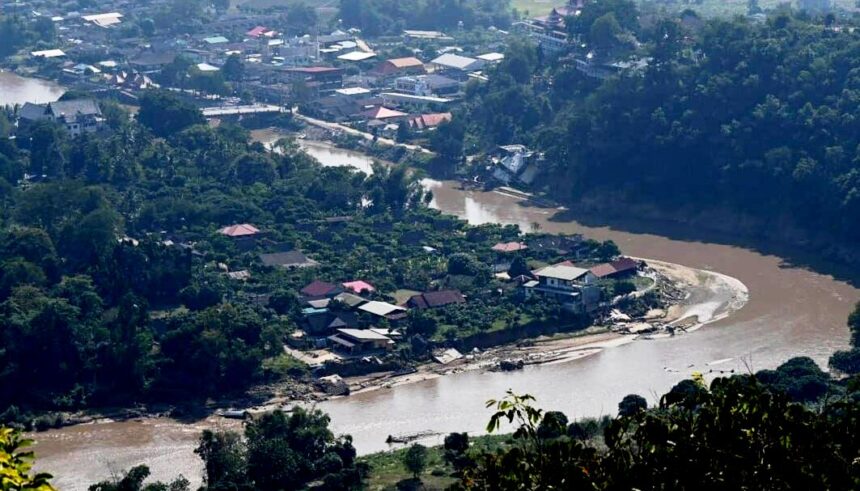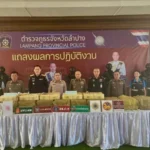Chiang Rai – On Monday, Mr. Chitwan Chinanuwat, a Member of Parliament from the People’s Party, shared his concerns about the ongoing struggles faced by communities along the Kok River. He said Residents, especially in Mueang District, are dealing with arsenic pollution in the Kok river.
This contamination comes from gold mining activities near the Kok river’s source in the Shan State of Myanmar. Mr Chitwan stressed the need for the government to quickly negotiate with those running the Chinese-backed mines upstream.
He pointed out that there’s no information about how, or if, they’re treating wastewater and what methods they use.
Chitwan has spent time in the affected areas and understands the challenges locals face. Normally, people swim and enjoy rafting during the hot season, but this year, with the river’s contamination, almost no tourists have come. Many businesses that rely on tourism are struggling or have shut down.
“The local tourism economy has collapsed. The river is murky and contaminated, and that’s driven people away. Some who’ve been in the water have developed rashes. There’s also concern about the impact on farming, since chemicals could linger in crops.
We need an alert system. We’ve already learned hard lessons from the flood six months ago,” Chitwan said.
Dredging of Rivers
When asked about the community’s anxiety with the rainy season coming and no clear disaster response plan, Chitwan explained that there are flood prevention measures in place. The army is dredging the Kok and Sai Rivers. However, he wants to see authorities learn from the losses suffered during the last disaster.
“I’d like to see clear updates about water levels and contamination standards, like how we get air quality updates on our phones for PM2.5. People in Chiang Rai have suffered floods, then toxic smog, and now the river’s polluted again. It’s tough for tourism—no one wants to come when the water is dirty and the air is bad,” he said.
Mr. Jamrat Kampangkham, a member of the Kok River Boat Operators’ Club in Chiang Rai, added that boat drivers are also affected by the arsenic contamination. Even though passengers don’t usually touch the water, the drop in tourist numbers has been sharp.
In past years, they could still get by, but since news broke about the polluted river, fewer people are visiting. He hopes the government can step in and support their struggling businesses.
“It’s tough. Sometimes it takes days to get a single job, like taking tourists to the Karen village. Boats from Tha Ton aren’t coming at all these days. Local fishers have disappeared too—nobody wants to go near the Kok River now,” said Jamrat.
Chinese investments
Associate Professor Dr. Lalita Hanwong from Kasetsart University, who specializes in Myanmar studies, said the arsenic issue has become an international problem. She believes Chinese investments are linked, but officials avoid discussing it. She doesn’t understand why they won’t address the root cause.
Dr. Lalita pointed out that Thai communities along the Kok River have already seen strange health issues tied to gold mining. The media reported that mines in Shan State are visible on Google Earth. If the Thai government doesn’t act, civil society groups might turn to legal action.
“If we know Chinese companies are mining in the Wa area—a region with its own semi-autonomous status—there’s little the Thai government can do within the old government-to-government framework.
If Thai officials try direct talks with Wa authorities, Myanmar’s military government would likely protest. Thailand needs to break out of this pattern and focus on solving the problem for our people,” Dr. Lalita said.
She added that the United Wa State Army (UWSA), which controls part of the mining concessions, has increased these operations since Myanmar’s coup. The largest mine in Wa South is a tin mine, and mining activity has risen.
Thailand needs to push China to pressure these Chinese-run gold mines at the source of the Kok and Sai Rivers.
Water Quality Testing
Reports say that Chiang Rai governor Mr. Charin Thongsuk, who chairs the Upper Mekong River Committee, is preparing to sign an order to set up a working group to address transboundary water quality issues.
Charin will lead the group, with deputy governors of Chiang Rai and Chiang Mai as vice chairs.
Members will include representatives from key agencies, such as the 37th Army Commander, the Pa Muang Task Force Commander, the regional environmental office director, district chiefs from Mae Ai and Mae Sai, and university researchers.
This committee is tasked with collecting data and analysing water quality issues in the Kok, Sai, and Mekong Rivers. They’ll create work-plans and solutions, coordinate with local and national agencies, and gather data on water use, management, restoration, and conservation.
The group also aims to get local communities and civil society involved in protecting and improving water resources.
Related News:
Riverside Vendors in Chiang Rai Face Closure Over Kok River Arsenic Contamination

Anna Wong serves as the editor of the Chiang Rai Times, bringing precision and clarity to the publication. Her leadership ensures that the news reaches readers with accuracy and insight. With a keen eye for detail,












